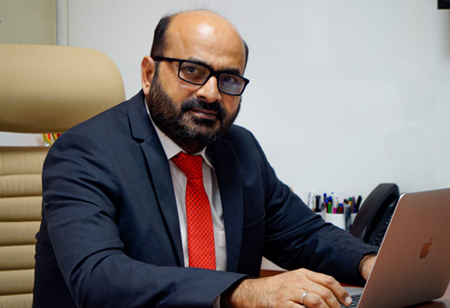
Leadership in The Age of Sustainability: Balancing Growth with Responsibility


Ashok Vashist, Founder and CEO, WTiCabs, 0
For decades, the pursuit of growth dominated corporate priorities—bigger profits, higher revenues, and greater market share were the defining metrics of success. However, due to rising consumer awareness regarding the effects of climate change and the role of industries in it, leaders are under increasing pressure to integrate ethical, environmental, and social considerations into their business strategies, reshaping the idea of responsible leadership. PwC’s 2024 Voice of the Consumer Survey reveals the shift in consumer behavior —from mere convenience to accountability. About 46 percent of the respondents in the survey said that they are now purchasing more sustainable products or those with a reduced climate impact. This shift in consumer priorities has brought in a new leadership paradigm, where profitability and sustainability are not mutually exclusive but interdependent.
Balancing Profit, People, and Planet
The modern era demands a more nuanced approach from contemporary industry leaders, integrating long-term environmental and social priorities into decision-making. In this context, frameworks like the Triple Bottom Line—which measures success through people, planet, and profit—have become essential guiding principles for business operations. For example, a company could adopt a strategy that not only focuses on profitability but also on reducing its carbon footprint (planet) and investing in fair labor practices (people). This approach demonstrates that sustainability can be a key driver of business success, creating value that benefits both the organization and society. This goes beyond theory; it demands thoughtful execution. Leaders now have to move beyond reactive, compliance-driven practices and adopt proactive strategies that align sustainability with innovation to foster business growth.
Turning Responsibility into Action with Technology and Innovation
Sustainability can no longer be a mere checkbox or marketing strategy; it has to be woven into the very fabric of the business operation. Leaders must cultivate interdisciplinary teams to reflect it at every level—from product design to supply chain management. Technology and innovation are
helping the industry leaders in fostering this transition toward a climate-conscious business approach. For example, many leaders are pushing for a transition toward electric vehicles (EVs) instead of relying on fossil-fuel vehicles for employee transportation. This commitment, whether through replacing fleets with EVs or partnering with third-party green mobility providers, underscores the company's dedication to environmental protection. It reduces the carbon footprint and enhances the company's reputation by positioning it as a leader in climate-conscious practices.
Creating Partnerships for Solving Global Challenges
Building strategic partnerships with governments, NGOs, and industry players to confront pressing issues like climate change and resource depletion is an equally important aspect of leadership in an era driven by sustainability. In the electric vehicle (EV) sector, for example, collaboration among car manufacturers, energy providers, and policymakers is key to expanding the charging infrastructure network and overcoming regulatory hurdles. These collaborative efforts show how shared responsibility can accelerate the shift to cleaner transport solutions.
Leadership in this context goes beyond top-down directives. It’s about creating networks where diverse stakeholders are united by a shared vision. Effective leaders understand that collaboration is essential to solving global challenges. They foster an ecosystem where partnerships thrive and innovation flourishes. By bringing together different voices and expertise, these leaders not only champion change but also lead with the humility to recognize that meaningful progress requires collective action.
Way Forward
The future of leadership is deeply intertwined with adaptability, foresight, and resilience. Leaders must anticipate emerging trends—whether in shifting regulations, evolving consumer demands, or rapid technological changes—and guide their organizations with agility. This requires a move away from traditional, rigid leadership models and toward more fluid, purpose-driven approaches. In the coming years, successful leaders will be those who can align their organizations with long-term sustainability goals. But their influence won’t stop there; they will shape broader societal change, driving innovation and fostering collaboration. By doing so, they will set a new benchmark of responsible leadership. In this new context, sustainability will not be viewed as a constraint but as a catalyst for reimagining growth.
Creating Partnerships for Solving Global Challenges
Building strategic partnerships with governments, NGOs, and industry players to confront pressing issues like climate change and resource depletion is an equally important aspect of leadership in an era driven by sustainability. In the electric vehicle (EV) sector, for example, collaboration among car manufacturers, energy providers, and policymakers is key to expanding the charging infrastructure network and overcoming regulatory hurdles. These collaborative efforts show how shared responsibility can accelerate the shift to cleaner transport solutions.
Leaders must anticipate emerging trends—whether in shifting regulations, evolving consumer demands, or rapid technological changes—and guide their organizations with agility
Leadership in this context goes beyond top-down directives. It’s about creating networks where diverse stakeholders are united by a shared vision. Effective leaders understand that collaboration is essential to solving global challenges. They foster an ecosystem where partnerships thrive and innovation flourishes. By bringing together different voices and expertise, these leaders not only champion change but also lead with the humility to recognize that meaningful progress requires collective action.
Way Forward
The future of leadership is deeply intertwined with adaptability, foresight, and resilience. Leaders must anticipate emerging trends—whether in shifting regulations, evolving consumer demands, or rapid technological changes—and guide their organizations with agility. This requires a move away from traditional, rigid leadership models and toward more fluid, purpose-driven approaches. In the coming years, successful leaders will be those who can align their organizations with long-term sustainability goals. But their influence won’t stop there; they will shape broader societal change, driving innovation and fostering collaboration. By doing so, they will set a new benchmark of responsible leadership. In this new context, sustainability will not be viewed as a constraint but as a catalyst for reimagining growth.